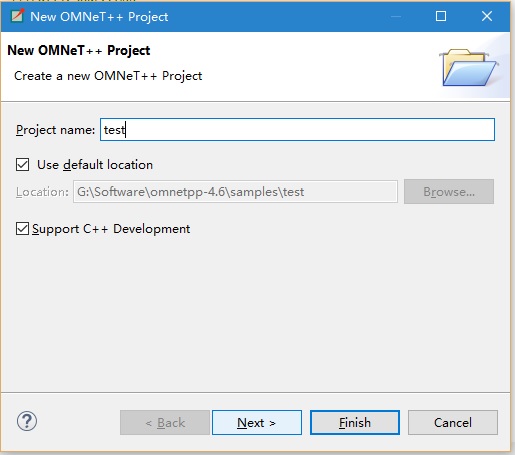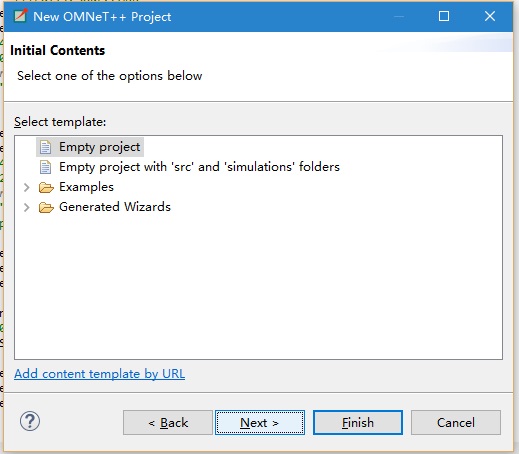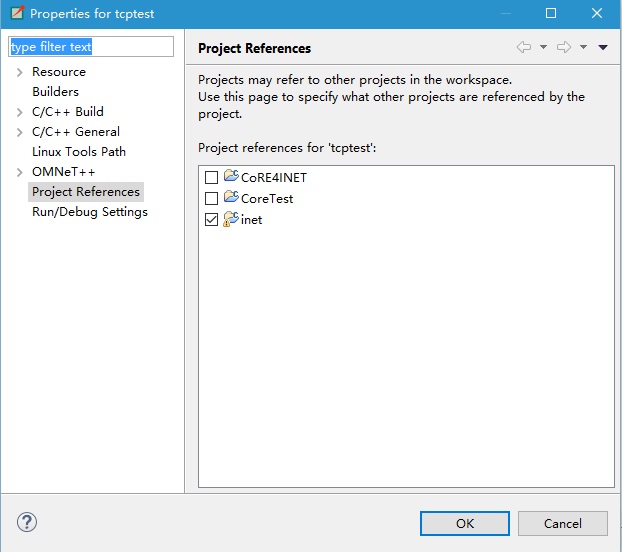在inet下写一个“HelloWorld”程序
2018-04-10 06:38
274 查看
写在最前
由于要用别人的项目代码来进行仿真,却不知道如何新建一个项目来跑自己的网络,故写下这篇文章。在inet的基础上,运行一个example上的例子。新建omnet++项目


新建test项目,empty project,之后直接按finish即可。
引用inet项目
对project 右键,properties。
新建ned
package tcptest;
import inet.networklayer.configurator.ipv4.IPv4NetworkConfigurator;
import inet.node.inet.Router;
import inet.node.inet.StandardHost;
import ned.DatarateChannel;
network net1
{
parameters:
@display("bgb=400,200");
submodules:
router: Router {
parameters:
@display("p=200,100;i=abstract/router");
gates:
pppg[2];
}
client: StandardHost {
parameters:
@display("p=50,100");
gates:
pppg[1];
}
server: StandardHost {
parameters:
@display("p=350,100;i=device/server");
gates:
pppg[1];
}
configurator: IPv4NetworkConfigurator;
connections:
router.pppg[0] <--> NormalPath <--> client.pppg[0];
router.pppg[1] <--> NormalPath <--> server.pppg[0];
}
channel NormalPath extends DatarateChannel
{
parameters:
datarate = 100Mbps;
delay = 0.0565us; // 10m
per = 0;
ber = 0;
}新建.ini配置文件
[General] network = net1 warnings = true sim-time-limit = 2.1s cmdenv-module-messages = true # for normal (non-express) mode only cmdenv-event-banners = true # for normal (non-express) mode only tkenv-plugin-path = ../../../etc/plugins # # Network specific settings # # set inet_addr, Mask, MTU ( = 1500), default route (=router) #**.client.routingTable.routingFile = "client.mrt" #**.router.routingTable.routingFile = "router.mrt" #**.server.routingTable.routingFile = "server.mrt" # ip settings **.ip.procDelay = 0s **.forwarding = false # hookType settings **.ppp[*].numOutputHooks = 1 **.ppp[*].outputHook[0].typename = "OrdinalBasedDropper" # Nop | ThruputMeter | OrdinalBasedDropper | OrdinalBasedDuplicator # ARP settings **.arp.retryTimeout = 1s **.arp.retryCount = 3 **.arp.cacheTimeout = 100s # NIC settings **.ppp[*].queueType = "DropTailQueue" **.ppp[*].queue.frameCapacity = 100 # packets # tcp apps - client **.client.numTcpApps = 1 **.client.tcpApp[*].typename = "TCPSessionApp" # FTP **.client.tcpApp[*].sendBytes = 100MiB **.client.tcpApp[*].active = true #**.client.tcpApp[*].localAddress = "172.0.0.1" **.client.tcpApp[*].localPort = 10020 **.client.tcpApp[*].connectAddress = "server" **.client.tcpApp[*].connectPort = 10021 **.client.tcpApp[*].tOpen = 0s **.client.tcpApp[*].tSend = 0s **.client.tcpApp[*].tClose = 0s **.client.tcpApp[*].sendScript = "" # tcp apps - server **.server.numTcpApps = 1 **.server.tcpApp[*].typename = "TCPSinkApp" #**.server.tcpApp[*].localAddress = "172.0.1.111" **.server.tcpApp[*].localPort = 10021 # tcp settings **.tcp.advertisedWindow = 65535 # in bytes, corresponds with the maximal receiver buffer capacity (Note: normally, NIC queues should be at least this size) **.tcp.delayedAcksEnabled = false # delayed ACK algorithm (RFC 1122) enabled/disabled **.tcp.nagleEnabled = true # Nagle's algorithm (RFC 896) enabled/disabled **.tcp.limitedTransmitEnabled = false # Limited Transmit algorithm (RFC 3042) enabled/disabled (can be used for TCPReno/TCPTahoe/TCPNewReno/TCPNoCongestionControl) **.tcp.increasedIWEnabled = false # Increased Initial Window (RFC 3390) enabled/disabled **.tcp.sackSupport = true # Selective Acknowledgment (RFC 2018, 2883, 3517) support (header option) (SACK will be enabled for a connection if both endpoints support it) **.tcp.windowScalingSupport = false # Window Scale (RFC 1323) support (header option) (WS will be enabled for a connection if both endpoints support it) **.tcp.timestampSupport = false # Timestamps (RFC 1323) support (header option) (TS will be enabled for a connection if both endpoints support it) **.tcp.mss = 500 # Maximum Segment Size (RFC 793) (header option) **.tcp.tcpAlgorithmClass = "TCPReno" # TCPReno/TCPTahoe/TCPNewReno/TCPNoCongestionControl/DumbTCP **.tcp.recordStats = true # recording of seqNum etc. into output vectors enabled/disabled # pcapRecorder settings **.numPcapRecorders = 1 # # Config specific settings # # Examples from [RFC2018]: # "Assume the left window edge is 5000 and that the data transmitter # sends a burst of 8 segments, each containing 500 data bytes." [RFC2018] [Config One] description = "RFC_2018_Case_1" **.client.pcapRecorder[0].pcapFile = "RFC_2018_Case_1_Client_Log.pcap" **.server.pcapRecorder[0].pcapFile = "RFC_2018_Case_1_Server_Log.pcap" **.client.ppp[*].outputHook[0].dropsVector = "17;18;19;20;" # "Case 1: The first 4 segments are received but the last 4 are # dropped. # # The data receiver will return a normal TCP ACK segment # acknowledging sequence number 7000, with no SACK option." [RFC2018] [Config Two] description = "RFC_2018_Case_2" **.client.pcapRecorder[0].pcapFile = "RFC_2018_Case_2_Client_Log.pcap" **.server.pcapRecorder[0].pcapFile = "RFC_2018_Case_2_Server_Log.pcap" **.client.ppp[*].outputHook[0].dropsVector = "13;" # "Case 2: The first segment is dropped but the remaining 7 are # received. # # Upon receiving each of the last seven packets, the data # receiver will return a TCP ACK segment that acknowledges # sequence number 5000 and contains a SACK option specifying # one block of queued data: # # Triggering ACK Left Edge Right Edge # Segment # # 5000 (lost) # 5500 5000 5500 6000 # 6000 5000 5500 6500 # 6500 5000 5500 7000 # 7000 5000 5500 7500 # 7500 5000 5500 8000 # 8000 5000 5500 8500 # 8500 5000 5500 9000" [RFC2018] [Config Three] description = "RFC_2018_Case_3" **.client.pcapRecorder[0].pcapFile = "RFC_2018_Case_3_Client_Log.pcap" **.server.pcapRecorder[0].pcapFile = "RFC_2018_Case_3_Server_Log.pcap" **.client.ppp[*].outputHook[0].dropsVector = "14;16;18;20;" # "Case 3: The 2nd, 4th, 6th, and 8th (last) segments are # dropped. # # The data receiver ACKs the first packet normally. The # third, fifth, and seventh packets trigger SACK options as # follows: # # Triggering ACK First Block 2nd Block 3rd Block # Segment Left Right Left Right Left Right # Edge Edge Edge Edge Edge Edge # # 5000 5500 # 5500 (lost) # 6000 5500 6000 6500 # 6500 (lost) # 7000 5500 7000 7500 6000 6500 # 7500 (lost) # 8000 5500 8000 8500 7000 7500 6000 6500 # 8500 (lost)" [RFC2018] # Examples from [RFC2883]: # # "Reporting Full Duplicate Segments # # We illustrate these guidelines with three examples. In each example, # we assume that the data receiver has first received eight segments of # 500 bytes each, and has sent an acknowledgement with the cumulative # acknowledgement field set to 4000 (assuming the first sequence number # is zero). The D-SACK block is underlined in each example." [RFC2883] [Config Four] description = "RFC_2883_Example_1" **.client.pcapRecorder[0].pcapFile = "RFC_2883_Example_1_Client_Log.pcap" **.server.pcapRecorder[0].pcapFile = "RFC_2883_Example_1_Server_Log.pcap" **.tcp.advertisedWindow = 1000 **.server.ppp[*].outputHook[0].dropsVector = "8;9;" # "Example 1: Reporting a duplicate segment. # # Because several ACK packets are lost, the data sender retransmits # packet 3000-3499, and the data receiver subsequently receives a # duplicate segment with sequence numbers 3000-3499. The receiver # sends an acknowledgement with the cumulative acknowledgement field # set to 4000, and the first, D-SACK block specifying sequence numbers # 3000-3500. # # Transmitted Received ACK Sent # Segment Segment (Including SACK Blocks) # # 3000-3499 3000-3499 3500 (ACK dropped) # 3500-3999 3500-3999 4000 (ACK dropped) # 3000-3499 3000-3499 4000, SACK=3000-3500 # ---------" [RFC2883] [Config Five] description = "RFC_2883_Example_2" **.client.pcapRecorder[0].pcapFile = "RFC_2883_Example_2_Client_Log.pcap" **.server.pcapRecorder[0].pcapFile = "RFC_2883_Example_2_Server_Log.pcap" **.tcp.advertisedWindow = 2000 **.client.ppp[*].outputHook[0].dropsVector = "11;" **.server.ppp[*].outputHook[0].dropsVector = "8;9;10;" # "Example 2: Reporting an out-of-order segment and a duplicate # segment. # # Following a lost data packet, the receiver receives an out-of-order # data segment, which triggers the SACK option as specified in RFC # 2018. Because of several lost ACK packets, the sender then # retransmits a data packet. The receiver receives the duplicate # packet, and reports it in the first, D-SACK block: # # Transmitted Received ACK Sent # Segment Segment (Including SACK Blocks) # # 3000-3499 3000-3499 3500 (ACK dropped) # 3500-3999 3500-3999 4000 (ACK dropped) # 4000-4499 (data packet dropped) # 4500-4999 4500-4999 4000, SACK=4500-5000 (ACK dropped) # 3000-3499 3000-3499 4000, SACK=3000-3500, 4500-5000 # ---------" [RFC2883] [Config Six] description = "RFC_2883_Example_3" **.client.pcapRecorder[0].pcapFile = "RFC_2883_Example_3_Client_Log.pcap" **.server.pcapRecorder[0].pcapFile = "RFC_2883_Example_3_Server_Log.pcap" **.client.ppp[*].numOutputHooks = 2 **.client.ppp[*].outputHook[0].typename = "OrdinalBasedDropper" # Nop | ThruputMeter | OrdinalBasedDropper | OrdinalBasedDuplicator | ... **.client.ppp[*].outputHook[0].dropsVector = "11;" **.client.ppp[*].outputHook[1].typename = "OrdinalBasedDuplicator" # Nop | ThruputMeter | OrdinalBasedDropper | OrdinalBasedDuplicator | ... **.client.ppp[*].outputHook[1].duplicatesVector = "12;" # "Example 3: Reporting a duplicate of an out-of-order segment. # # Because of a lost data packet, the receiver receives two out-of-order # segments. The receiver next receives a duplicate segment for one of # these out-of-order segments: # # Transmitted Received ACK Sent # Segment Segment (Including SACK Blocks) # # 3500-3999 3500-3999 4000 # 4000-4499 (data packet dropped) # 4500-4999 4500-4999 4000, SACK=4500-5000 # 5000-5499 5000-5499 4000, SACK=4500-5500 # (duplicated packet) # 5000-5499 4000, SACK=5000-5500, 4500-5500 # ---------" [RFC2883] # References # # [RFC2018] Mathis, M., Mahdavi, J., Floyd, S. and Romanow, A., "TCP # Selective Acknowledgment Options", RFC 2018, October 1996. # # [RFC2883] Floyd, S., Mahdavi, J., Mathis, M. and Podolsky, M., "An # Extension to the Selective Acknowledgement (SACK) Option # for TCP", RFC 2883, July 2000.
build project
搞定
水了篇博客,跟自己做人一样相关文章推荐
- 一个WCF的HelloWorld程序
- Ajax完成一个简单的HelloWorld程序
- 对类HelloWorld程序中添加一个MessageBox弹窗
- node.js写一个简单的helloWorld程序
- 一个标准的helloworld程序(java)
- 创建一个Spring的HelloWorld程序
- JAVA-一个简单的JSP程序(HelloWorld)
- 一、SpringMVC基础入门,创建一个HelloWorld程序
- 14.11.3【node.js】做一个最简单的helloworld程序
- SpringMVC基础入门,创建一个HelloWorld程序
- GNU C - 一个别致的HelloWorld程序 引申到: __attribute__((constructor)|(destructor)(PRIORITY))
- 如何在linux下创建一个简单的JNI程序HelloWorld
- 对类HelloWorld程序中添加一个MessageBox弹窗
- 菜鸟功略(怎样运行好一个HelloWorld程序)
- Java Learning 001 新建一个Java工程 HelloWorld程序
- Java Learning 001 新建一个Java工程 HelloWorld程序
- 让我们用Backbone.js来写一个HelloWorld程序。
- JNI入门 一个JNI的HelloWorld 程序
- 编写一个程序,当程序输入Ctrl+C时,输出字符串“ Ctrl+C I got signal”,输入第5次时,程序退出 ,在其余时间,改程序循环打印helloworld信息
- 如何使用Node.js在Ubuntu上写一个HelloWorld程序
